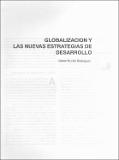| dc.contributor.author | Murillo Rodríguez, Carlos | |
| dc.date.accessioned | 2020-11-10T18:21:02Z | |
| dc.date.available | 2020-11-10T18:21:02Z | |
| dc.date.issued | 1997-12 | |
| dc.identifier.issn | 2215-2997 | |
| dc.identifier.other | https://www.revistas.una.ac.cr/index.php/abra/article/view/4333/4163 | |
| dc.identifier.uri | http://hdl.handle.net/11056/18595 | |
| dc.description.abstract | La globalización es, eminentemente, un
fenómeno tecnológico que permea la
cultura, las relaciones sociales y, en
general, la forma en cómo las sociedades funcionan.
Hoy en día, la revolución en las comunicaciones hace que los conceptos de espacio y tiempo tengan dimensiones muy distintas a las de hace
cincuenta años. Los cambios en el transporte, en
el campo de la informática junto a fenómenos
como internet, la comunicación por vía satélite,
fax, teléfono celular y la televisión por cable, han
acortado las distancias en el planeta. Esto nos ha
conducido a que hoy la interdependencia entre las
naciones y los individuos sea más evidente que
nunca. Desde nuestros hogares pudimos seguir
en vivo la guerra del Golfo Pérsico o la de los
Balcanes. Por medio de internet tenemos acceso
a las bibliotecas o centros de información de
universidades importantes y mediante el transporte aéreo podemos desplazarnos a cualquier parte
del mundo en pocas horas. Toda esta revolución
tecnológica tiene un efecto inmediato en nuestra
vida cotidiana. | es_ES |
| dc.description.abstract | Globalization is, eminently, a
technological phenomenon that permeates the
culture, social relations and, in
general, the way in which societies function.
Today, the revolution in communications means that the concepts of space and time have very different dimensions from those of yesteryear.
fifty years. The changes in transportation, in
the field of computer science together with phenomena
like the Internet, communication via satellite,
fax, cell phone and cable TV, have
shortened the distances on the planet. This has
led to the fact that today the interdependence between
nations and individuals is more evident that
never. From our homes we could follow
live the Persian Gulf War or the
Balkans. Through the internet we have access to
to the libraries or information centers of
important universities and by means of air transport we can travel anywhere
of the world in a few hours. All this revolution
technology has an immediate effect on our
daily life. | es_ES |
| dc.description.sponsorship | Universidad Nacional, Costa Rica | es_ES |
| dc.language.iso | spa | es_ES |
| dc.publisher | Editorial de la Universidad Nacional | es_ES |
| dc.rights | Acceso abierto | es_ES |
| dc.rights.uri | http://creativecommons.org/licenses/by-nc-sa/4.0/ | * |
| dc.source | Revista ABRA Vol. 18, No. 25-26, p. 39-45 | es_ES |
| dc.subject | GLOBALIZACIÓN | es_ES |
| dc.subject | GLOBALIZATION | es_ES |
| dc.subject | ECONOMÍA INTERNACIONAL | es_ES |
| dc.subject | MODELOS | es_ES |
| dc.subject | MODELS | es_ES |
| dc.subject | ESTRATEGIAS DE DESARROLLO | es_ES |
| dc.subject | DEVELOPMENT STRATEGIES | es_ES |
| dc.subject | INTERNATIONAL ECONOMY | es_ES |
| dc.title | Globalización y las nuevas estrategias de desarrollo | es_ES |
| dc.title.alternative | Globalization and new development strategies | es_ES |
| dc.type | http://purl.org/coar/resource_type/c_6501 | es_ES |
| dc.description.procedence | Escuela de Sociología | es_ES |


